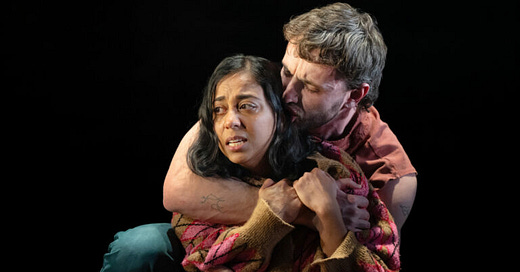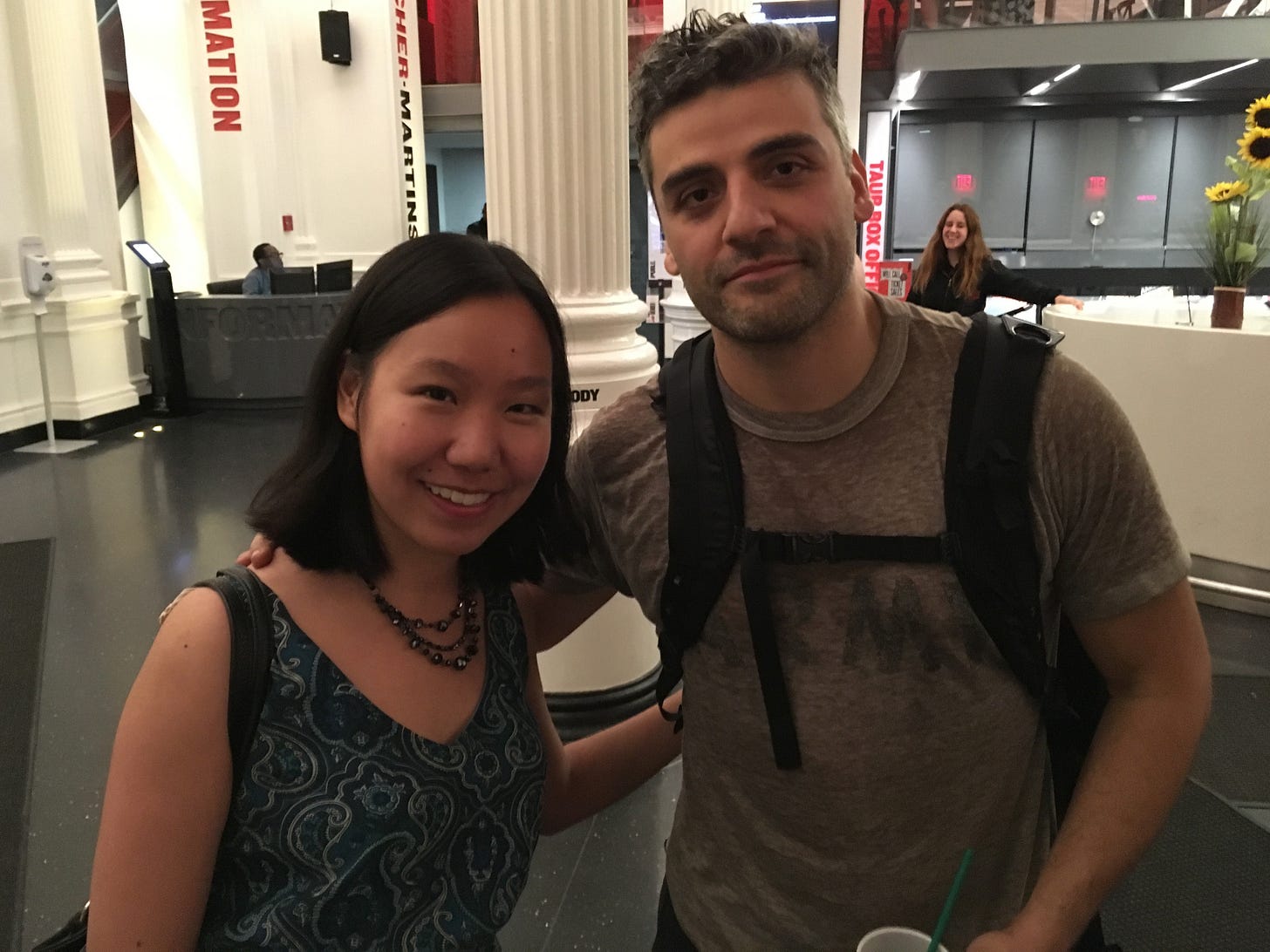How Paul Mescal sent me down a high school rabbit hole
On BAM's sold-out "Streetcar" production + thoughts about the high school literary canon on stage

This week’s Marginalia: how seeing BAM’s buzzy production of “A Streetcar Named Desire” made me think about what works or doesn’t work when reviving the classics, especially those of what I'm calling the high school literary canon. (If you and I attended high school together, please stick around until the very end for a little sidebar about a question you might be able to help me answer!)
One of the hot ticket items here in Brooklyn this spring is the Brooklyn Academy of Music's sold-out run of "A Streetcar Named Desire." The reason for this is almost entirely because it stars man of the moment Paul Mescal as Stanley Kowalski, after an acclaimed run in London.
Revisiting something after many years is always kind of a trip, especially if it's one of those pieces of work very strongly associated with high school English class. I had forgotten the revelations about Blanche that come out later in the play. And I had forgotten that Stanley is not the play’s most interesting character. It’s the Brando of it all, isn’t it? Brando originating the role might be the sole reason for the character's cultural ubiquity.
As for Mescal, adding to his otherwise sterling résumé of what one of my friends refers to as his "sad boy” (or "sad boi"?) roles, he’s solid but not as memorable as I had hoped. The real highlights are Patsy Ferran and Anjana Vasan’s far more dynamic performances as Blanche and Stella, respectively, proving they are the more interesting characters.
However, the accent work is quite questionable. Ferran and Vasan do their best. Mescal's attempt at a Southern accent turns into a… vaguely New York one? Several other actors lose their attempted accents completely, taking you out of the play’s languor. The frequent reminders that this production is a London transfer is not a good sign here!
The two most visible staging choices — interpretive dance sequences as interstitials, and drumming as frequent musical accompaniment — are hit or miss. In select moments, each enhances elements of the play. The movement adds to the symbolism and power dynamics between the characters; the drums ratchet up the tension. But most other times, it feels too much like: we are doing this to hold your attention and make this play "modern" — which ends up just being distracting.
Finding ways to enliven fixtures of the high school English class canon (insert the valid caveats and criticisms of what that typically includes and excludes) is a constant challenge. (To keep this contained, I'm only talking about theater — but the problem of novelty of course extends to film and television adaptations as well.) I've sat through a few too many middling modern "Macbeth" productions in one lifetime. "Hamlet" is another high school English class staple that gets restaged and reconfigured far too frequently, to mixed results.
There's no formula to successfully reviving a classic, no pithy explanation for why a particular version works or doesn’t. Case in point: the most memorable "Hamlet" (or "Hamlet"-adjacent) productions I have ever seen are almost entirely opposite in their approaches. In 2017, the Public Theater staged the play with Oscar Isaac as the embattled prince. If memory serves, it was a pretty barebones, minimalist production, carried by the text and its electrifying star as its vessel.
Five years later, the Public put on "Fat Ham." James Ijames’ Pulitzer Prize-winning text isn't a direct replication of the Bard. But anyone will recognize the structure of protagonist Juicy’s family and the plot of avenging his father's death. The boisterous and sidesplitting play unfolds during a Black family’s cookout in the present-day South. (When Juicy says: "There's the rub," you can't help but chuckle in recognition at the double entendre.) While there’s a clear lineage to the source material, infusing it with modernity and cultural specificity makes the play burst with life.
To stick to the text or to deviate from it: that is the question, or at least one of them. The answer varies, and there is perhaps infinite space between those two poles. But one counterpoint in the purists’ favor: I don't think I'll ever have a theatrical experience as singular as last fall's run of "Gatz," the Elevator Repair Service's unabridged "dramatization" of "The Great Gatsby."
I use air quotes because it's hard to describe exactly what the show is. "Staged reading" is too simplistic; "reenactment" doesn't capture that it's unabridged. The cast members are office workers at some boring desk jobs. One worker finds a copy of "Gatsby" buried in his desk drawer and starts to read it aloud, assuming the role of Nick Carraway. Gradually, his coworkers come into the fold as the various characters. They reenact every single line, all within the office setting and using office-related props. But thanks to some creative lighting and staging choices, eventually you start to forget about the office, and you really feel like you’re, say, in the library at Gatsby’s house.
"Gatz" is a marathon: two intermissions and a dinner break. During the first intermission, trying to soak up some rays of sunlight before slouching back to our seats for another few chapters, some fellow critics and I chatted about how the show's approach had renewed our appreciation for Fitzgerald’s prose, which I hadn't read in 15 years. (I noticed a handful of audience members brought their copies of the book to follow along.) When we reached those famous final paragraphs ("Most of the big shore places were closed now…"), I leaned forward in recognition, having been absolutely rapt through most of the second half.
There's a difference in hearing every single word, compared to watching the screen adaptations, which often omit or truncate large chunks of the text — for understandable reasons. Hearing it out loud is even more effective than reading it, when your eyes dart around, searching for sections to skim over. The simplicity of the way "Gatz" sticks directly to the text is actually kind of novel.
While worth the battle royale to get tickets, BAM's "Streetcar" production obscures the text, even while adhering to it. Star power gets people in the door, and in this case, the star power even delivers. But when the text is the star, all of the bells and whistles get in the way.
Sidebar for the high school friends: In revisiting "Streetcar," I’ve been working off of this vague, hazy assumption that we read it senior year in AP4. But for some inexplicable reason, I started to second-guess myself, and went down a very winding rabbit hole to find some written confirmation. I keep meticulous records of many aspects of my life, so I went through my folders of papers from high school, as well as my senior year planner. No dice. The only evidence: since 2007, I have logged every single film I have ever watched, and per my records, in May of 2011 (the year in question), I watched the 1951 Kazan adaptation. I asked a couple of old friends (who might be reading this — hi, thank you, and sorry for the random shoutout!). One of them is fairly sure we did in fact read the text and watch the film in class senior year, which would confirm this timeline.
But it's still eating at me. Maybe it's the journalist in me that's bothered by not having written documentation of this. Adding to my lack of closure, I suppose — and this is where this meandering tangent also gets sad: The only person who could definitively confirm this died five years ago (and I've felt his absence in relaunching this newsletter, since he regularly read its previous iteration and would send me enthusiastic feedback. I'd like to think he's bellowing beyond the grave: Fanger! Of course we read “Streetcar!”) If any of you have more concrete recollections than I do (or even better: a written record), please drop me a line. And thanks for bearing with me through this uncharacteristically sentimental sidebar.
To everyone: thanks for reading. What are your experiences of revisiting and reevaluating the high school literary canon? Has seeing a play after many years away from it unlocked any new observations? Have you seen any stage versions of a literary classic that were particularly memorable (good or bad)? As always, I’d love to hear about it.




